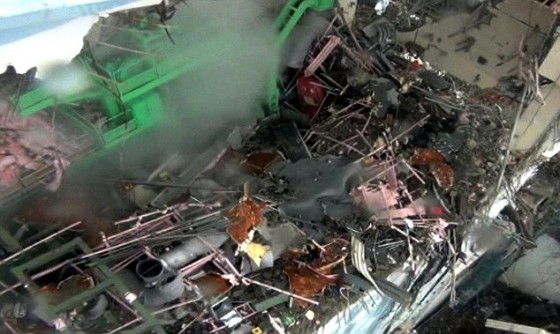 Destroyed reactor: Dead Zone for 100 years?
Destroyed reactor: Dead Zone for 100 years?
Three of Japan’s stricken Fukushima nuclear reactors may now be in a meltdown situation according to nuclear energy experts studying the ongoing situation and the amount of radiation in reactor core water leaking into the sea. What’s worse, workers at the plant who have been exposed to high amounts of radiation are expected to “die within weeks” according to an article in UK based Daily Mail. The only option remaining appears to be to pour large amounts of concrete onto the reactor cores and permanently seal them. This means, the Fukushima plant, like the one at Chernobyl, is for all practical purposes a “dead” plant, which also goes for the geographical area surrounding the plant for a distance of 30 km. “It will take 50 –100 years before the reactor rods will be cool enough to remove” a UK nuclear energy expert said.
As for the Fukushima nuclear plant, workers known now as the “Fukushima 50” they realize their health situation and made the decision to “die if necessary to save the nation”.
Highly radioactive water continues to flow into the sea through a 20 cm (8 inch) crack in the fuel rod shaft of the No. 2 reactor at the plant.
According to a CNN news article:
“samples of seawater taken 330 meters (361 yards) offshore were said to have levels of iodine-131 at 4,385 times above the standard and cesium-137 at 527 times beyond normal. Experts say the latter radioactive isotope (cesium-137)may be a greater concern because it persists longer, taking 30 years to lose half its radiation.”
In comparison, iodine-131 loses its radioactivity “half life” after only 8 days. But while iodine-131 does cause thyroid cancer, especially in children; it’s the cesium-137 radiation that is the really bad stuff as it burns your flesh, melts your bones, and kills you quickly.
The radioactivity is now threatening to affect some of Japan’s best fishing grounds if carried by the Oyashio and Kuroshio ocean currents off Japan’s eastern coastline.
Meanwhile, this video news clip reports that executives of the Tokyo Electric Power Company (TEPCO) have been coming under increasing public criticism which has reached the point where they have been receiving death threats and are also having their home addresses and salaries posted on various web blogs. Such sayings as “how to execute a TEPCO exec” and “death is too good for them – they (the executives) should be made to go into the plant” have also been posted.
Taking all of this into account, the Japan nuclear crises is far from being over. So with this in mind, and with countries like Jordan considering building coastal nuclear power plants in locations like the Red Sea Port of Aqaba .
At present, the building of such a plant is only being considered as a possible option, along with the construction of the sea water conduit between the Red and Dead Sea to bring sea water to replenish the Dead Sea as well as provide fresh water from desalination and electricity from a planned hydroelectric facility. Jordan’s need for both fresh water, as well as energy may result in its “going alone” to construct at least part of this mammoth engineering project.
Depending on which way you look at it, building a nuclear power plant by Aqaba would be the worst option, as a nuclear accident at such a plant could turn this area, including neighboring Eilat, into a “dead zone”.
Israel has also considered building a nuclear power plant, but its location would be in the middle of the desert, if that is reassuring enough.
The main argument about using nuclear energy to generate electricity, as opposed to burning fossil fuels, was made in an OPED on March 23 in the New York Times in which the writer says :
“The 1986 Chernobyl accident will ultimately kill about 10,000 people, mostly from cancer. Coal plants are much deadlier: the fine-particulate air pollution they produce kills about 10,000 people each year in the United States alone.”
While this may be comforting to some people, it certainly isn’t to others, including this writer. And for, sure it isn’t very assuring to the “Fukushima 50” and to thousands of other Japanese. As to people living in this part of the world, it shouldn’t be very reassuring either.
Read More On How Nuclear Energy Plants Could Affect Mid East Environment:
Jordan Uranium Discoveries Could Damage Fragile Ecosystem
Jordan Considers the Nuclear Option Despite Plans for Clean Fuel on the Go
Japan Nuclear Meltdown Will Seriously Affect World Environment
As Japan Nuclear Plants Melt Down, Israel Considers Building “Safe” One in the Desert

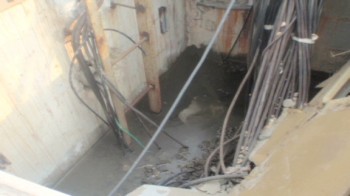
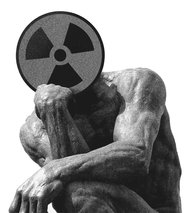
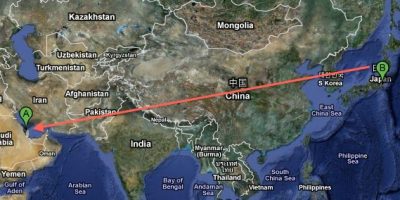
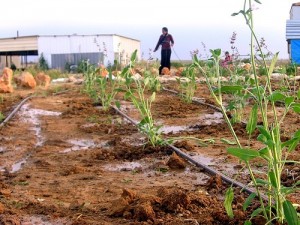
If this is true, guys, where can this data be accessed? We also have to include deaths and severe ailments of people living in European countries, including Germany, Austria, Hungary, Poland, etc., etc.
The Japanese death rate and cancer incidents from this disaster is only beginning.
The true cost will be astronomical, i dont see how you can replace nuclear without a radical shift to thin film solar, industrial hemp and genuine conservation. I dont think it will happen anytime soon.
I pray that the authorities are on red alert from now on, Nuclear is too deadly to take chances.
and that’s only deaths, not debility and disability of health of other medical ailments
the chernobyl figure in this article is the industry generated low figure, to be blunt, a lie. The independent science figure is in the range of a million, and still counting.